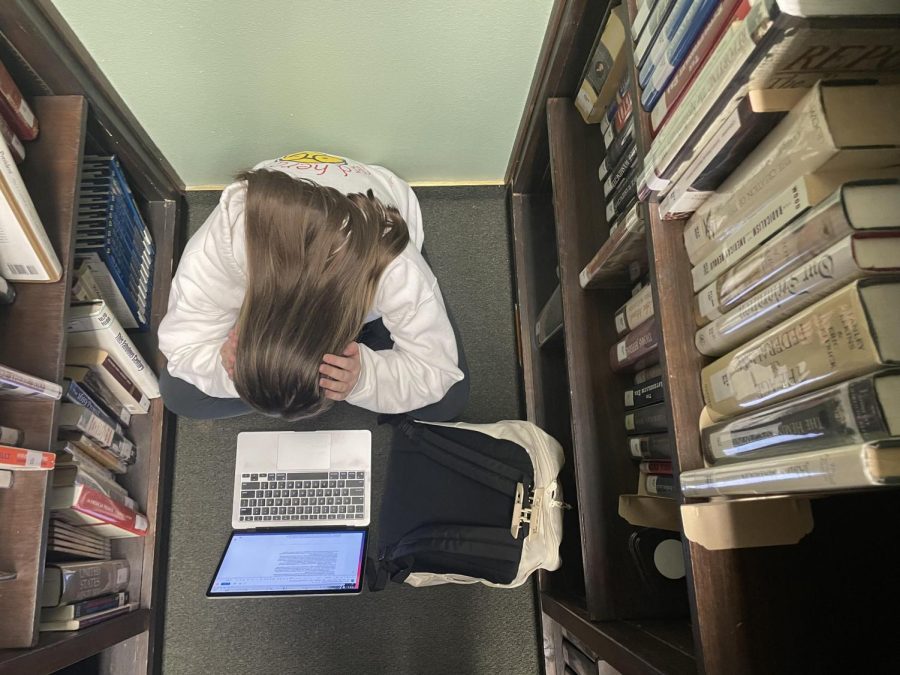Treat yo’ self (but only after homework)
When the demands of school and extracurriculars become overwhelming, students retreat to the library to work, reducing their much-needed break time.
Get good grades, make the team, get cast in the play, build your portfolio, pad your resume. Get enough sleep, prioritize your mental health and make choices for yourself. High school students are bombarded with pressure to achieve their highest potential, while simultaneously they are preached the necessity of maintaining positive mental health and self-image.
These conflicting messages pervade students’ lives, leaving them wondering how they can attain both, a damaging mindset that often does more harm than good. The widespread messaging must end in order for high school students to thrive, allowing them to choose their well-being before the expectations demanded of them by the media.
In recent years, I’ve experienced this pressure firsthand as it overwhelms me and my peers. Societal expectations demand we start building our college portfolio as early as freshman year, earn straight A’s and achieve as much as possible. Sometimes it feels as though anything less than perfect is unacceptable. It’s no surprise that, according to the CDC, 37% of high school students in the U.S. have experienced poor mental health. Additionally, a staggering 44% had felt persistent sadness or hopelessness that caused them to stop doing their usual activities.
“I think students feel pressured to be in as many things as they can, and I think some of that is potentially driven by college,” Ms. Abagael Davitt, Campus Ministry and Religion Teacher said. “But then I also think along with that there might just be a pressure to be this epitome of a FSH student, a successful FSH student, which equals being involved in so many things.”
When mental health is not ignored altogether, it is demanded just as much as well-roundedness. Ironically, ‘grind culture’, a term recently coined by the media, serves as a barrier between students and self-love, in a paradoxical cycle. Few individuals can attain both the ideal mental state we hear about so often as well as balance school and several activities at the same time. The media’s insistence that students must be high-achieving to get into college is not only false, it teaches students that their academic achievement should be prioritized above all else, even at the expense of their mental health.
“Pressure can come from many sources, whether that be from adults the student knows or the student themself creating competition,” Kana Park ‘23 said. “I see it in classmates who favor studying over sleep, homework over food, and school over relationships. These students often don’t leave time for themselves because they see their work or curriculars as who they are rather than an extra asset to their overall individuality.”
This is precisely why these contradictory messages need to end. The more academic and social achievement is pushed for by the media, the more students lose themselves in pursuit of perfection. When a student correlates their worth to their achievement, their self-image will suffer when they inevitably fail. So how do we as a society eliminate these detrimental messages?
One way FSH is working to help students grappling with academic pressures is through the Mental Health and Awareness Committee. The Mental Health and Awareness Committee works to reduce and aid struggling students. Sara Gutierrez ‘23, a board member of the MHAC, recognizes the essentiality of good mental health and provided the following tips to maintain it.
“Definitely getting up at a time that works for you, having a good breakfast, and going over what you need to do for the day helps to be prepared for the day,” Gutierrez said. “I also think doing small meditations before school can be helpful. As you probably know, we have the wellness center which I think definitely helps in reducing stress in students, but also the wellness days during lunch that Ms. Nardon holds.”
Keeping positive mental health and self-image are just as vital to school as they are one’s personal life. Despite common misconceptions, self-love is not selfish and should be an integral part of a person’s life. Unfortunately, telling students to simply ignore the pressures and practice self-love is not effective. Maintaining good mental health takes work, much like any school assignment. While the last thing high school students already inundated with pressure want to hear is that they need to work towards one more goal, this one is crucial above all else.
“Mental health is what keeps us going as human beings. If you mentally feel unwell, that will soon affect your physical well-being,” Kana Park said. “We are social and emotional people that connect to each other through deep talks, light conversation, and knowing one another. To have mental health is to have the capacity to create and nurture relationships with others and especially with yourself.”
Now, more than ever, cultivating good mental health is essential to high school students’ daily lives. We cannot whisk away the demands perpetuated by the media, but we can remind ourselves that our well-being should be paramount, and supporting it is by no means self-centered. No, students shouldn’t have to choose between these unreasonable demands and the preservation of their mental health, but as it is we must choose wellness. When our mental health is strong, the goals we’re working towards are just one step closer to being actualized. Good mental health is essential to high school students’ daily lives.

Tyler Frey '25 is an associate editor of the Veritas Shield, returning for her second year on the paper. Being a part of The Shield serves as a creative...

